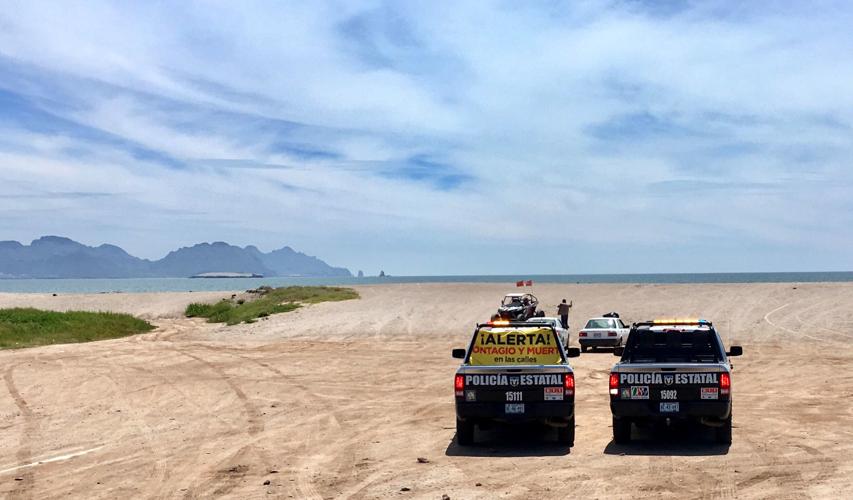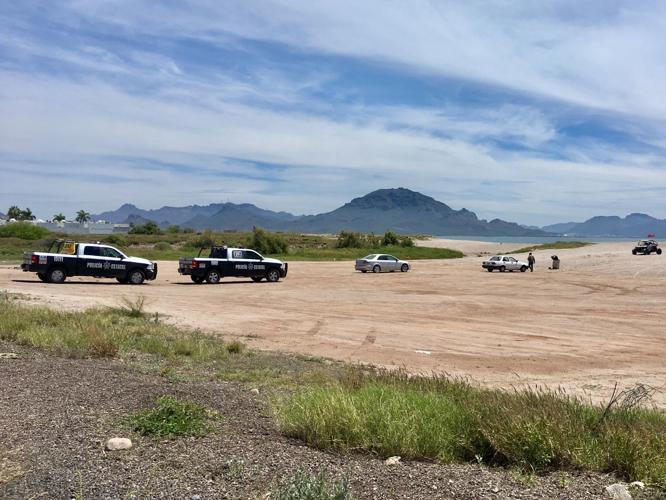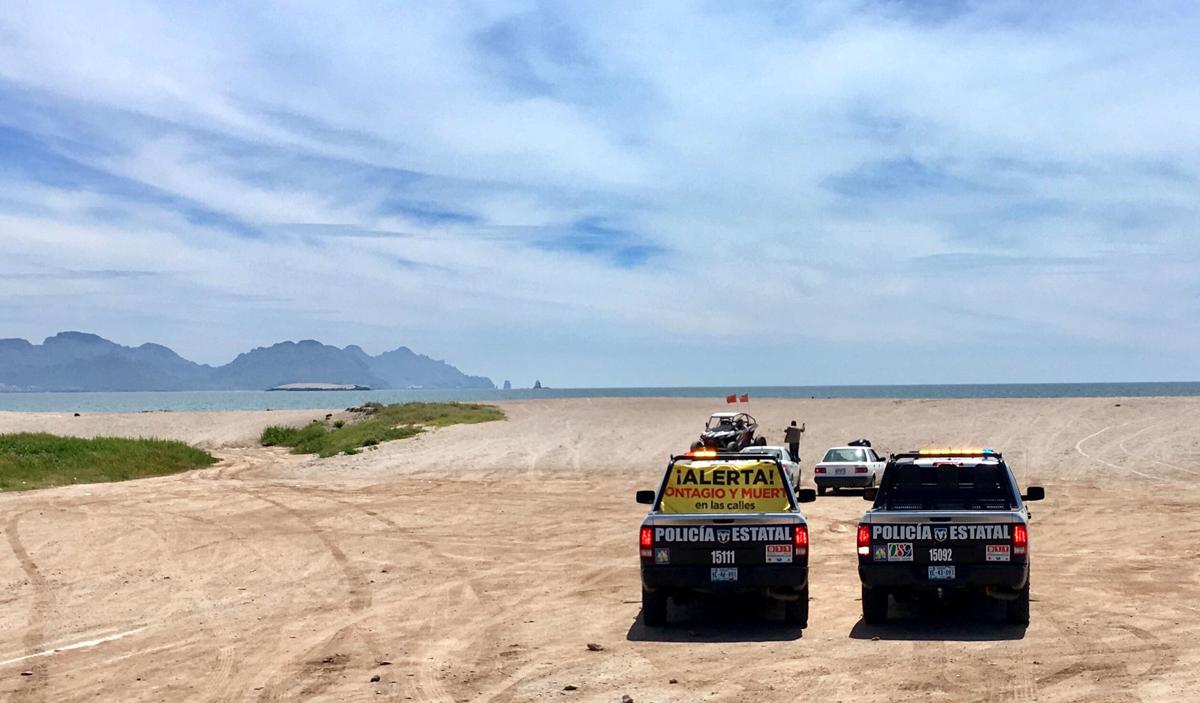SAN CARLOS, SONORA — Sonoran beach towns have a message for tourists during the normally celebratory and raucous week leading up to Easter: Stay away.
As community transmission of the novel coronavirus accelerates in Mexico, prompting widespread beach closures, roadblocks and curfews, state and local law enforcement are making themselves more visible — and audible — to potential violators.
Over the weekend in San Carlos, blue-and-white police trucks cruised the main highway, blasting chilling warnings through a loudspeaker: “We are in a health emergency. … Stay in your house.”
A yellow banner on the back of one police vehicle reads, “Alerta: Contagio y muerte en las calles.” Contagion and death in the streets.
“We’re trying to make people conscious” of the danger, said Enrique Gámez, San Carlos police commissioner. “We’ve never had a crisis like this.”
In coastal towns throughout Mexico, Holy Week, or Semana Santa, is usually big business for hotels, rental properties, bars, restaurants and gift shops. In San Carlos, revelers typically crowd the beaches and trigger bumper-to-bumper traffic in the normally quiet town.
But on Tuesday, a police checkpoint blocked the only highway access to San Carlos, as heavily armed state police officers turned away travelers who couldn’t prove they live there. The checkpoint will remain in place at least through Easter and the following week, Gámez said.
A curfew of 8 p.m. to 6 a.m. is also in effect, but police are not authorized to sanction violators, Gámez said. They will, however, stop motorists out past curfew and ask them to return home immediately if their activity isn’t essential, he said.
The main entrances to Bahia Kino and Puerto Peñasco, known to many Arizonans as Kino Bay and Rocky Point, are also blocked by police or military checkpoints, prohibiting nonresidents from entering.
In Bahia Kino, police are stopping pedestrians on the street to ask for ID, said Betty Martinez, a 12-year resident of Bahia Kino and a Mexican national. Martinez manages Club Deportivo, a nonprofit social club with 350 members who are primarily from the U.S. and Canada.
Many of those members have decided to remain in Bahia Kino during the pandemic, despite recommendations from the U.S. State Department for citizens to return home, she said.
They feel safer in a quiet beach town than in their home countries, she said.
“To see the police presence around the beaches and in the streets is comforting,” she said. “We feel safer knowing police are out on the streets making sure nobody is out spreading the virus, and nobody is coming in who may have been contaminated.”
Municipal police broadcast warnings to residents of San Carlos, Sonora, on Sunday, April 5, urging everyone to stay at home. The announcement states: "Alert! We are in a health emergency. It's an obligation to follow the warnings and recommendations of the public health department to mitigate the spreading of COVID-19." Video by Emily Bregel / for the Arizona Daily Star
In Puerto Peñasco, Holy Week typically generates 120,000 beach visitors and $6.8 million in economic activity, Héctor Vazquez, president of Puerto Peñasco’s Office of Conventions and Visitors, said in an interview Tuesday.
Not this year. There was no time for the tourism sector to prepare for the severe economic impact of COVID-19. As a result, businesses are hurting, Vazquez said.
“It’s like everything comes too quickly: Let’s close the border, and then the curfew, and the checkpoints at the entrance” to the town, he said. “It’s hard, and more (so) when it’s in your high season.”
On Saturday, Sonora’s health council recommended aggressive new measures to contain the spread of the virus, including restricting gasoline sales to deter travel. State labor officials have yet to analyze the proposed measures.
But rumors of possible gas restrictions prompted a brief run of panic-buying in San Carlos last weekend, with lines of cars stretching into the road to at least one gas station on Saturday.
Sonora confirmed its first COVID-19 case on March 16. Sonora Gov. Claudia Pavlovich declared a national health emergency on March 25, urging all residents to “quedate en casa” — stay at home.
At last count, Sonora had confirmed 36 cases of coronavirus, including four deaths. There have been two confirmed coronavirus cases in Guaymas, the municipality that includes San Carlos, and 14 confirmed cases in Hermosillo, the state’s capital which includes Bahia Kino, 70 miles away. As in the U.S., limited testing likely dramatically understates the virus’s toll in Mexico.

State and municipal police officers ordered civilians to exit a popular San Carlos beach on Sunday. Enrique Gámez, San Carlos police commissioner, said beach closures apply primarily to large groups. But locals report enforcement has been heavy-handed.
The U.S. and Mexico reached an agreement last month to limit nonessential travel across the border, but regulation of southbound traffic is minimal. Mexican officials have said they won’t stop border crossers from coming but will rely on travelers to quarantine themselves upon arrival.
In San Carlos, Gámez said beach closures apply primarily to large groups; one or two individuals walking on an empty beach shouldn’t warrant police intervention, he said.
But locals report that enforcement has been heavy-handed, as police have been ordering individuals or pairs off nearly empty beaches.
Throughout Sonora, nonessential businesses have been ordered to close. In San Carlos, most restaurants are shuttered or limited to carryout orders. Some holdouts are still seating a limited number of diners, with servers wearing masks and placing hand sanitizer at patrons’ tables.
Although support for the measures is strong, officials and residents hope they won’t last long. The Puerto Peñasco tourism office is urging tourists not to cancel their travel plans entirely, but to postpone them.
“We will be waiting for you here in Peñasco when the situation permits you to come,” Vazquez said.
Photos for April 1: Tucson gets by during Coronavirus Pandemic
Tucson, coronavirus
Updated
A dinosaur statue over the doors of MATS Dojo at 5929 E. 22nd St., sports an athletic cup for a face mask in the second week of COVID-19 restrictions, March 31, 2020, Tucson, Ariz.
Tucson, coronavirus
Updated
A pair of protestors use their car to block west bound traffic on Silverlake to let other protestors make the left turn in into the Pima County Adult Detention Complex during a vehicle based demonstration by #FreeThemAll for the release of prisoners in light of the COVID-19 pandemic, March 31, 2020, Tucson, Ariz.
Tucson, coronavirus
Updated
Raj Paudel hands a bag of food to a customer at Govinda's to-go-tent located at 711 E. Blacklidge Drive, on April 1, 2020.
Tucson, coronavirus
Updated
The biggest hit to employment in Arizona came in the leisure and hospitality industry — hotels, bars, restaurants and places of amusement — which alone shed 5,200 jobs.
Tucson, coronavirus
Updated
John Aldecoa tapes up a banner outside his restaurant, Brother John's, as he and his staff get ready to serve again after being closed since the COVID-19 restrictions were put in place two weeks ago, April 1, 2020, Tucson, Ariz.
Tucson, coronavirus
Updated
Michael Olivas, right, helps Arnold Vizcaino, City of Tucson Parks and Recreation employees, lock up swings at Gene C. Reid Park, 900 S. Randolph Way, in Tucson, Ariz., on April 1, 2020. The City of Tucson Parks and Recreation employees are going around to all Tucson parks to close all ramadas, gazebos, playgrounds, outdoor fitness equipment, all sports courts and fields, horseshoe pits and splash pads due Coronavirus Disease (COVID-19).
Tucson, coronavirus
Updated
Caution tape across an entrance on a playground at Gene C. Reid Park, 900 S. Randolph Way, in Tucson, Ariz., on April 1, 2020. City of Tucson Parks and Recreation employees are closing all ramadas, gazebos, playgrounds, outdoor fitness equipment, sports courts and more due to the coronavirus outbreak.
Tucson, coronavirus
Updated
A "CLOSED' sign and caution tape is placed around a ramada at Gene C. Reid Park, 900 S. Randolph Way, in Tucson, Ariz., on April 1, 2020. The City of Tucson Parks and Recreation employees are going around to all Tucson parks to close all ramadas, gazebos, playgrounds, outdoor fitness equipment, all sports courts and fields, horseshoe pits and splash pads due Coronavirus Disease (COVID-19).
Tucson, coronavirus
Updated
Vanessa Richards, 18, left, and Ella Dotson, 17, adjust their mortar boards and hair in the window of a building along Scott Ave. in downtown Tucson on March 31, 2020. Due to the coronavirus (COVID-19) pandemic the rest of the school year has been canceled. Richards and Dotson are seniors at Marana High School and will not have a formal graduation ceremony. The pair came to downtown to get photos of themselves in their caps and gowns.
Tucson, coronavirus
Updated
Vanessa Richards, 18, left, and Ella Dotson, 17, take a selfie as their friend, Camilla Hamilton, 17, gets her photo taken by Vanessa’s mother, Chrissi, along Scott Ave. in downtown Tucson on March 31, 2020. Due to the coronavirus, the rest of the school year has been canceled. The Marana High School seniors went downtown to get photos of themselves in their caps and gowns.
Tucson, coronavirus
Updated
Georgia Goodwin, volunteer, sews masks for hospital workers and the community at Cathey's Sewing and Vacuum, 5701 E. Speedway Blvd., in Tucson, Ariz., on March 30, 2020. Cathey's Sewing and Vacuum have made roughly 2,000 masks, due to Coronavirus Disease (COVID-19), in one week for local hospitals in Southern Arizona.
Tucson, coronavirus
Updated
Along with other volunteers and employees, Paula Sanford, center, volunteer, sews masks for hospital workers and the community at Cathey's Sewing and Vacuum, 5701 E. Speedway Blvd., in Tucson, Ariz., on March 30, 2020. Cathey's Sewing and Vacuum have made roughly 2,000 masks, due to Coronavirus Disease (COVID-19), in one week for local hospitals in Southern Arizona.
Tucson, coronavirus
Updated
Andy Cathey, Cathey's Sewing and Vacuum employee, sews masks for hospital workers and the community at Cathey's Sewing and Vacuum, 5701 E. Speedway Blvd., in Tucson, Ariz., on March 30, 2020. Cathey's Sewing and Vacuum have made roughly 2,000 masks, due to Coronavirus Disease (COVID-19), in one week for local hospitals in Southern Arizona.
Tucson, coronavirus
Updated
Andy Cathey, Cathey's Sewing and Vacuum employee, sews masks for hospital workers and the community at Cathey's Sewing and Vacuum, 5701 E. Speedway Blvd., in Tucson, Ariz., on March 30, 2020. Cathey's Sewing and Vacuum have made roughly 2,000 masks, due to Coronavirus Disease (COVID-19), in one week for local hospitals in Southern Arizona.
Tucson, coronavirus
Updated
Rudy Arriaga, far left, and his mother, Dale, chat with Damian Velez, far right, general manager and Joseph Ashbacher before leaving with their takeout order at Bianchi's Italian Restaurant, 3640 W. Tangerine Road, in Marana, Ariz. on March 30, 2020. The Marana location will closed due to a drop in business.
Tucson, coronavirus
Updated
A man wearing personal protective equipment works out at FitCore at Morris K Udall Park, 7200 E. Tanque Verde Rd., in Tucson, Ariz., on March 29, 2020.
Tucson, coronavirus
Updated
Ruby Boulet-Stephenson waters the family's new backyard garden, on March 27, 2020.
Tucson, coronavirus
Updated
Roccos Little Chicago Pizzeria sports the phrase "Eat the Rich" on its marquee, on March 31, 2020. The local pizza spot is currently closed due to Coronavirus disease (COVID-19.)
Tucson, coronavirus
Updated
A pedestrian crosses Church Avenue near the Historic Pima County Courthouse in a nearly-empty downtown Tucson during the coronavirus pandemic in spring 2020.
Tucson, coronavirus
Updated
A bank customer wears gloves while at a drive up ATM at Chase Bank, 8701 E. Broadway Blvd., in Tucson, Ariz., on March 29, 2020.
Tucson, coronavirus
Updated
While traveling through Tucson, Canadians Lauri Buchanan and her husband Brian Buchanan, left, eat lunch with their friends Rhonda McDonald and her husband Pat McDonald, right, from Wyoming, outside of Whataburger, 6504 E. 22nd St., in Tucson, Ariz., on March 30, 2020. Mr. and Mrs. Buchanan and Mr. and Mrs. McDonald were eating outside due to Coronavirus Disease (COVID-19).
Tucson, coronavirus
Updated
David Cardinal, a sales associate at The Hub, works with a customer at the gun store located at 1400 S Alvernon Way, on March 28, 2020. The store saw an increase in customers during the last few weeks.
Tucson, coronavirus
Updated
An employee at The Hub, a gun store located at 1400 S Alvernon Way, works with a customer on March 28, 2020. The store saw an increase in customers during the last few weeks.
Tucson, coronavirus
Updated
Cassie Phelps, food service employee for Tucson Unified School District, hands two students lunches and breakfast at Harold Steel Elementary School, 700 S. Sarnoff Dr., in Tucson, Ariz., on March 31, 2020. TUSD is offering lunches and breakfast for students due to schools being canceled because of Coronavirus Disease (COVID-19).
Tucson, coronavirus
Updated
Jolene Luquin, teaching assistant for Tucson Unified School District, organizes educational packets for a parent at Harold Steel Elementary School, 700 S. Sarnoff Dr., in Tucson, Ariz., on March 31, 2020. The educational packets, for grades K-12, include the curriculum for all classes from science to math to history and others. It allows the students, parents and teachers to keep learning despite not being in the classroom, according to Karla Escamilla, TUSD public information officer. TUSD plans to have most of the paperwork online in the next couple of weeks, said Escamilla, as well as issue laptops to students who don't have access to a computer. TUSD is issuing these packets and online school due to Coronavirus Disease (COVID-19).
Tucson, coronavirus
Updated
After more than a week in isolation, Tami and Tedd Handy get the chance to dance as Mama Coal, Carra Stasney and Tim O'Connor give a street concert on Placita de Zacatal in the Casas Adobes neighborhood, Saturday, March 28, 2020, Tucson, Ariz.
Tucson, coronavirus
Updated
Mama Coal, Carra Stasney and Tim O'Connor take to the great outdoors along Moonshroud Dr., in Catalina Shadows, Saturday, March 28, 2020, Tucson, Ariz.






